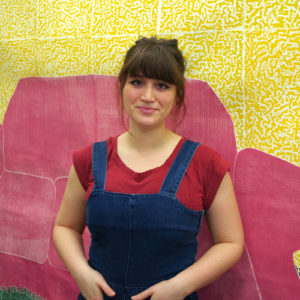
A recent graduate from the University of the Arts in Philly, Ornella Xariklea has a unique voice and compelling stories to share. This summer, we asked Ornella to create original artwork for Tempesta’s five main projects in our 2019-2020 Concert Series and the result has been an exciting spread of color. We were thrilled to sit down with her this summer and hear more about her life.
From your website, we learned that you were born in London and grew up in Greece, then moved to the United States and we would love to know more about your story.
So I immigrated here in 2013. My mom is British and my dad is Greek and like you said, I was born in London but we moved to Greece when I was two. So I spent 19 years living in Greece and I have always considered myself to be more Greek than British, even though my first language is English. I also went to an American school in Greece, so people always get confused because they think of me as being American since I speak with an American accent because of going to that American school. It’s this weird thing throughout my life and it definitely plays into my work because I essentially have these three identities. The Brit, the Greek and now, the American and to me that American one is this multicultural universal identity that I feel very much at home with. So I came here in a fiancé visa and my husband is Greek and that’s how I came into the country.
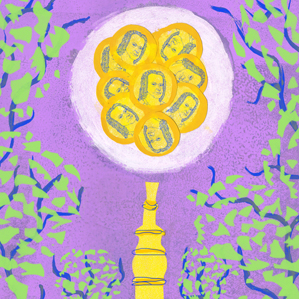
That’s really interesting! And what made you decide to start at the University of the Arts and study Illustration?
So my artistic journey is a weird one, as I’m sure most people’s is. I’ve always been an artist, my school was very small in Greece. There was probably about a hundred students ranging from kindergarten all the way to 12th grade, so I was the one artist in the school. I painted all the theater sets and stuff. So I was sure I was going to go into art and then I went back to England after I graduated with an Associates degree in Art and Design and I loved it but the intensity of it scared me. I wasn’t sure if being a “Fine Artist” was what I wanted to do. So I decided “Oh, I’ll be a nurse” of all the things because I just love working with people, collaboration, and just the stories and the exchanges that you have with people. I’m a social person and I wanted that aspect of the job.
But I was not creative for a while and I realized that my soul really craved it and so I kind of realized fairly quickly that it was a bit ridiculous for me to be a nurse considering I am dyslexic, I can barely remember my multiplications so being a nurse would have been a disaster, haha. So I was researching and I found UArts and I just loved the diversity of courses that you can take because being this multidimensional cultural character I also apply that to my work and I loved doing mix media and doing many different things. I love that UArts gave me that ability. I only applied there because I felt that I either get in there or I don’t get in at all. And when I was accepted I started my artistic career.
So when you first moved to the United States, did you land in Philly?
Yeah, we were right outside in the suburbs initially and then we lived in West Chester where I had my first job working at QVC. I showed up for this group interview and there were 300 people there and everyone was buzzing about this QVC thing. But as a European, I had no idea what they were talking about. And everyone is like “Oh my God” every time I tell them I used to work there, “Oh wow”. I didn’t understand the vastness of that company and I worked as a Fraud Investigator. It was my first introduction to corporate America and I quickly realized that I would never thrive in a cubicle job but it was a really wonderful experience to be immersed into American culture as an immigrant. I think it is hard to sometimes find a way into the community here, and so I made my first friends there and it was just a really wonderful experience learning and overcoming the insecurities that you have as an immigrant. Especially since I look American and I sound very American, and I think I struggled with that.
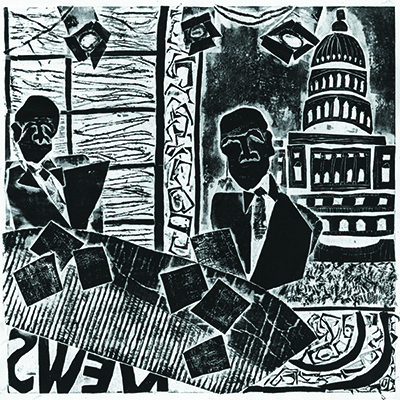
And then after that, you moved into Philly and started at UArts? What made you decide on Illustration?
So, I didn’t know what Illustration was. And I actually translated it from English into Greek and it comes out as εικονογράφος (eikonográfos), which means “Maker of images”. But in the translation, it comes as maker of religious images, so there’s not really an actual translation in Greek, which I thought was really interesting. So as most art students, I thought “I need to make money and be successful, so I’m going to go into Graphic Design”, not really understanding what Graphic Design was. And then I took my first Illustration class just on a fluke as extra credit and I fell in love. I realized how diverse illustration was and how it can be a career. I have the possibility to do multiple different jobs and every job is different and exciting. And because of my personality, I really thrive off of that, and I was hooked. I ended up being an Illustration major and I quickly realized that printmaking is also a part of my life and so I minored in Printmaking. I really love the process aspect of it. I find it very meditative and so I use Printmaking in my work, as I did in all of these images. All of the marks are Printmaking marks that I combined with other mediums.
Yeah, tell us about your process and how you achieve all of the textures. Your images are so powerful and engaging.
Thank you! I think what I got so excited about when I first heard about this job was how deep the stories are and I’m very much conceptual in my mark-making and image-making, I’m a storyteller in the way I approach how I make an image. So that’s where I started off, with these beautiful stories and descriptions behind each piece and performance. And then I tried to replicate that with the marks. I usually start with a super rough sketch and then I kind of try to feel out the marks that make sense for that piece. So my pieces start to change and transform and even though, overall my portfolio looks like me, every piece has a different energy because I really try to pay respect to that project and make sure the marks and everything makes sense for that story. It is very intuitive and I would say my sketching is like 10% of figuring it out and the process of making is 90% of just responding to the marks on the page and playing with color.
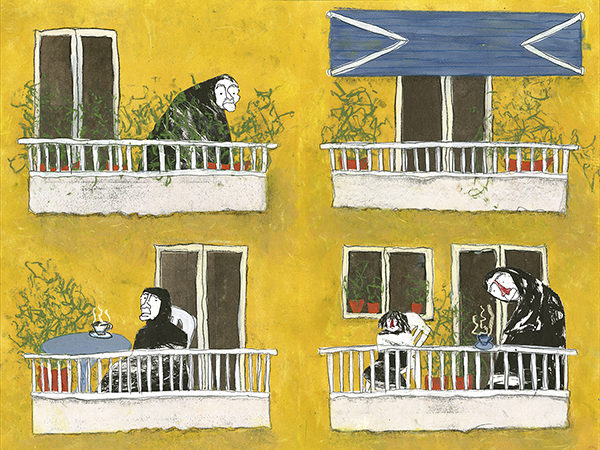
From seeing your work on your website and portfolio, your color palette is always beautiful, but this one for Tempesta di Mare is quite bright. How was that different?
In the beginning of me figuring out my artistic voice, which I’m still trying to figure out because that’s something I think all artists continue to develop forever and ever, I was a lot darker and recently I have been trying to embrace a more colorful and risky palette and just kind of be playful. I was thinking about the use of these images and how they are there to attract people to these performances. And with all the pieces I listened to Tempesta’s music and it just felt colorful to me. So I wanted to go more vibrant and I felt that on a poster that you are seeing from the bar, I wanted you to see the colors but then come closer and see the depth of texture that I love, and the layers of information.
Going back to some of your other pieces. There is a lot of your cultural identity in it and I was wondering how you marry all those different aspects of your life into your work?
That’s a tough one. My driving force is definitely my culture and how I identify as Greek. It’s a form of nostalgia, I think revisiting these images that are so familiar to me but are not accessible to me now that I’m here in America. So trying to bring back those in images is really important to me. But I have learned to transform them, obviously, when the message is different than that of a personal story. It all comes down to the layers of information, so the layers of my language, for example. I always joke that my friends who don’t speak both English and Greek, can’t fully understand me 100%, I’m sure you can relate as someone who’s bilingual. There’s a different personality to it. But imagery, because it’s universal, it’s an exciting way to show that double side to you. So that’s how I put my culture in my work, it’s developing every day and changing, as I grow.
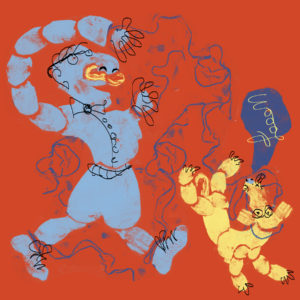
That’s very true. So now that you’re done with school, what are your next plans?
I have a few different projects in the works. I’m currently working on an animation project for this film company which has the potential to be a pretty big project. I’m reanimating a logo for this production company out of the UK and they are in the process of making a really big movie, so you might be able to see it on the big screen here, which is super exciting. But you know, with the movie industry, it is very up and down, but either way, it’s very exciting to do something animation-wise because I love to do that as well. And I’m currently working on writing a few pitches to different publishers to talk about my immigration journey, but more specifically the journey of how my grandfather and my great grandmother came to Greece. And the roots of what it means to be Greek from my side of the family because Greece’s history is so deep that every family has its own origins story of how they got to Greece because Greece used to be triple the size that it is now. Yeah, I really like to write, I want to tell my story and I think that with the state of America right now, it is important for immigrants to talk about where they came from and just the diversity of our stories and how it is the immigrants that have influenced America today. And I would love to share my perspective of what it means to be Greek, you know, historically we have contributed so much and with it being in the state that it is, with its economic crisis and whatnot, I feel like I owe it to my roots to tell that story.
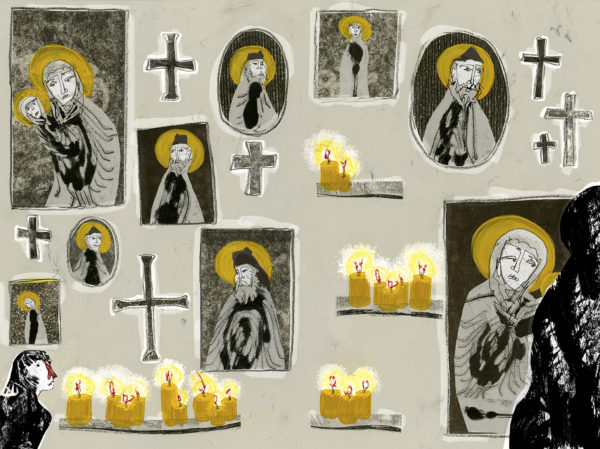
It’s so important indeed! It’s great that you’re bringing your culture into these stories.
Yeah, more specifically, I want to write about the sacrifices of mothers and how they have formed the lives of their children and the children after that. I just think with what is going on in our border, the separation of these children from their parents, the importance a parent plays in their child’s life, that is very much what my story is about. So hopefully I get the opportunity to tell it, and if not, I’m sure I will find a way. And I will be illustrating it and writing it of course!
This is all really great and exciting! Is there anything else you would like to share with us?
We have covered so much! I’m a talker, as you can tell. I think this is it, thank you so much for having me!
To learn more about Ornella’s artwork, check out https://ornellaxariklea.com
